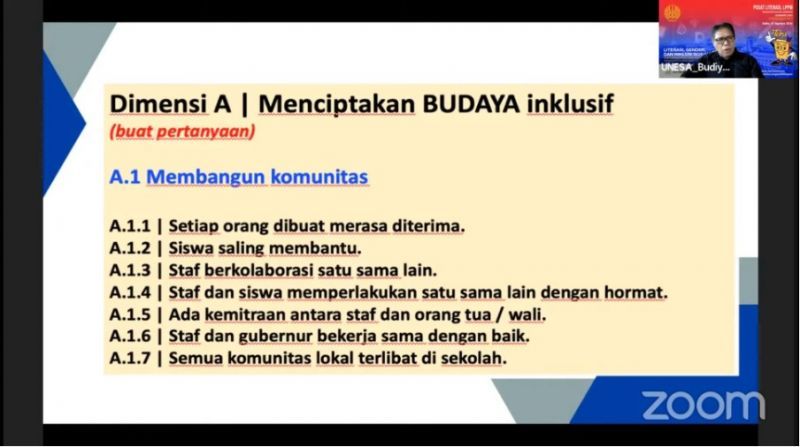National Workshop on Mainstreaming Literacy, Gender and Social Inclusion in Learning

Unesa.ac.id SURABAYA-The second series of the National Online Workshop (Sadaring) held by the Center for Literacy Studies, Research Institute, and Community Service (LPPM) of Surabaya State University (UNESA) carries the topic “Mainstreaming Literacy, Gender, and Social Inclusion in Reference and Learning” on Saturday, August 31, 2024.
Wien Muldian, Chairman of the Indonesian Literacy Association, Manager and Owner of Baca in Tebet participated in presenting his material at this Sadaring. The other two presenters came from FIP UNESA; FIP professor and Chair of the Disability Innovation Center (DIC), Budiyanto, and Head of the Gender Center, LPPM Sjafiatul Mardliyah.
This activity was moderated by FBS lecturers, Riki Nasrullah, and Fafi Inayatillah. It was also enlivened by the participation of a book reading by Rina Syahrina, a student of the International Class of Indonesian Literature Class 2023.
Targeting participants from teachers, lecturers, students, students, literacy observers, education observers, and the community, this activity aims to explore more deeply the crucial role of literacy, gender, and social inclusion in the world of librarianship, especially in library processing, bibliometrics, and the learning process.

The event also discussed the various efforts that have been made, challenges faced, and innovative strategies that can be implemented to ensure that literacy, gender, and social inclusion become an integral part of better librarianship practices.
Thus, the main objective of this activity is to formulate concrete steps to realize libraries that are inclusive and relevant to the needs of diverse communities.
With the theme “Social Inclusion in Learning,” Budiyanto discussed social inclusion with a focus on the inclusion index, decent accommodation, and ULD (Disability Service Unit). He explained that the success of social inclusion can be measured using the inclusion index, which shows the level of social inclusion in education.
In addition, he emphasized the importance of reasonable accommodation for learners with disabilities, including modifications and adjustments needed to ensure human rights and fundamental freedoms for them.
Budiyanto also outlined the role of the Disability Services Unit (ULD) in providing services and facilities that support social inclusion, including the facilitation of the provision of budget support, facilities, and infrastructure, as well as the preparation and provision of specialized educators to provide effective learning services for learners with disabilities.

In the next session, Wien Muldian discussed the importance of literacy and libraries in the context of social inclusion and knowledge management. She emphasized that literacy is not just the ability to read, but also includes the skills to access, understand and use information intelligently.
Muldian advocated for the strengthening of literacy environments through libraries and reading parks, and highlighted good practices from various countries in building a reading culture. In addition, he emphasized the role of libraries in the digital era and the importance of collaboration to improve people's reading power and build literate and humanist characters.
Next, Sjafiatul Mardliyah, presented the topic “Gender in Learning: A Bibliometric Analysis” which highlighted how gender roles, identities and stereotypes affect the education process.
She mentioned six important aspects related to gender in learning: access to education, gender stereotypes, influence of teachers and curriculum, role models, gender violence and harassment, and gender awareness in teaching.
By organizing this webinar, it is hoped that it can be the first step in realizing a more inclusive and relevant library in Indonesia. []
***
Reporter: Tarisa Adistia (FBS)
Editor: @zam*
Photo: UNESA HUMAS Team
streaming : https://www.youtube.com/live/VO_-ueDpgcE?si=8ZORS0Gwt0kcUBiF
Share It On: